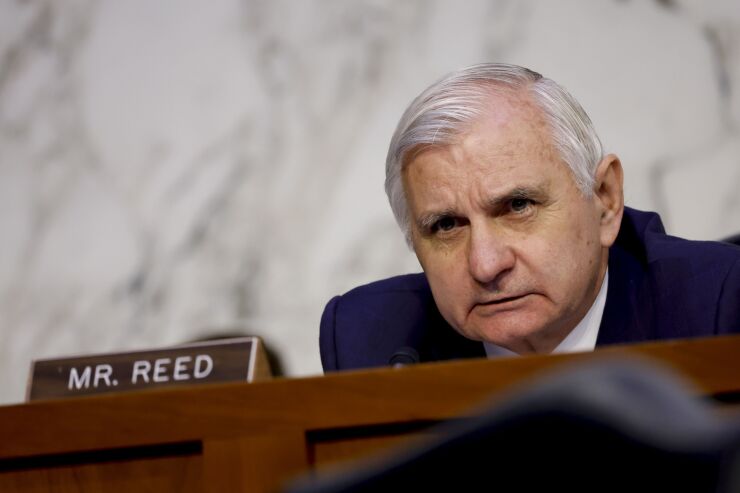
Sen. Jack Reed, D-R.I., wants the Federal Reserve to scrutinize synthetic risk transfers, claiming the transactions are being overly leveraged and are
Reed sent a letter Friday to Federal Reserve Chair Jerome Powell asking for the Fed to require public reporting of credit risk transfers through bank call reports and systemic risk reports. Reed, a senior member of the Senate Banking Committee,
"These transactions are becoming leveraged. Investors can borrow up to 60% of the funds for an investment," Reed said in the letter, noting that most investors in CRTs are borrowing money — typically from Wall Street banks — to finance the investments.
The transfers enable banks to sell off future credit losses in their loan portfolios to third-party investors — typically private equity funds, hedge funds, private credit funds, and other big nonbank financial institutions. A major concern is that the investors are not subject to regulation and supervision, do not make public disclosures and do not need to meet risk management requirements, Reed said.
"If riskier loans in CRTs fail at the same time, then banks that lent this money may not be repaid or could be repaid in illiquid securities," he wrote. "In that situation, risks would come crashing back to the banking sector and losses would ripple through the financial system more broadly."
Last month, at a House Financial Services Committee meeting, Rep. Bill Foster, D-Ill., asked Powell to explain whether the investments "could become a dangerous source of contagion," noting the similarity between the transactions and the use of credit default swaps leading up to the 2008 financial crisis.
Powell admitted that "there could be a breakdown," because "the risk isn't really well and fully transferred to the buyer."
"Is that risk going away, off the balance sheet in an unconditional kind of a way, in a way that the bank understands? And that's a good thing, if banks are able to do that," Powell said. "Then the question is, is it coming back through the backdoor with financing? And so, we're well aware of that. Banks do tend to bring these things to us, and we look at them carefully. We understand some of the ways it can go wrong, but at the end of the day, if it works to reduce the risk on a bank's balance sheet, that's something we should be okay with."
Powell also said that the Fed is "very clear on what we think our requirements are. This is what I'm told. We saw it wrong the last time. I think no one wants to repeat that, including the banks."
In the letter, Reed asked Powell to establish quantitative limits on banks using CRTs to reduce their capital requirements, and on using CRT proceeds as unrestricted cash that can be used to pay dividends or buy back stock. He said Powell should ensure that the current stress testing methodology expressly considers the different ways that risk being laid off through the sale of CRTs could affect the banking system in an economic downturn or financial crisis. A major concern is whether banks would have reduced lending capacity from issuing CRTs.
"Without a full understanding of the data and risks associated with CRTs, I am concerned that widespread efforts to avoid stronger capital and regulatory requirements put in place as a response to the 2008 crisis could expose the financial system to new risks," Reed said. "These concerns are especially acute because banks are not required to disclose any information regarding CRTs."






